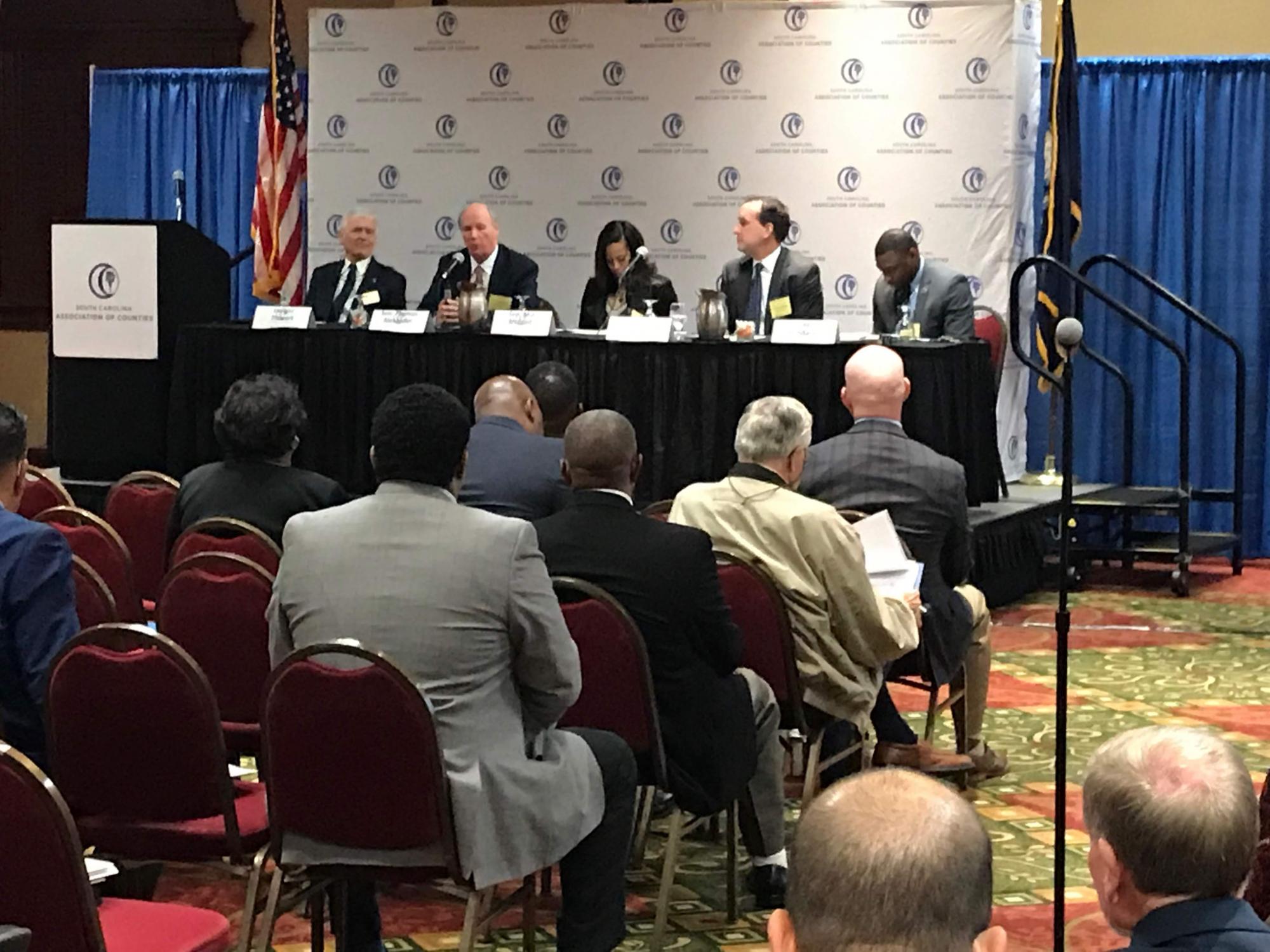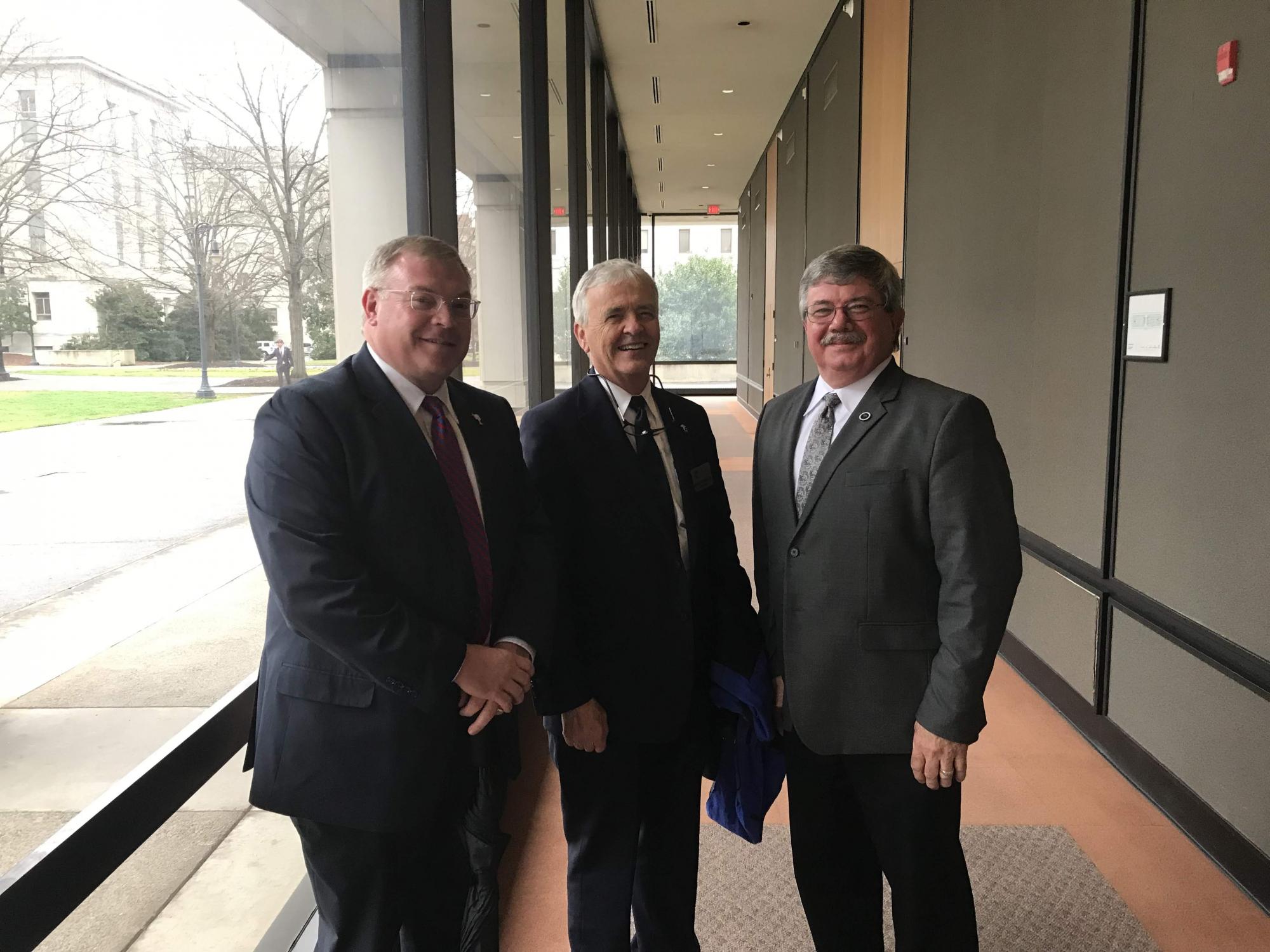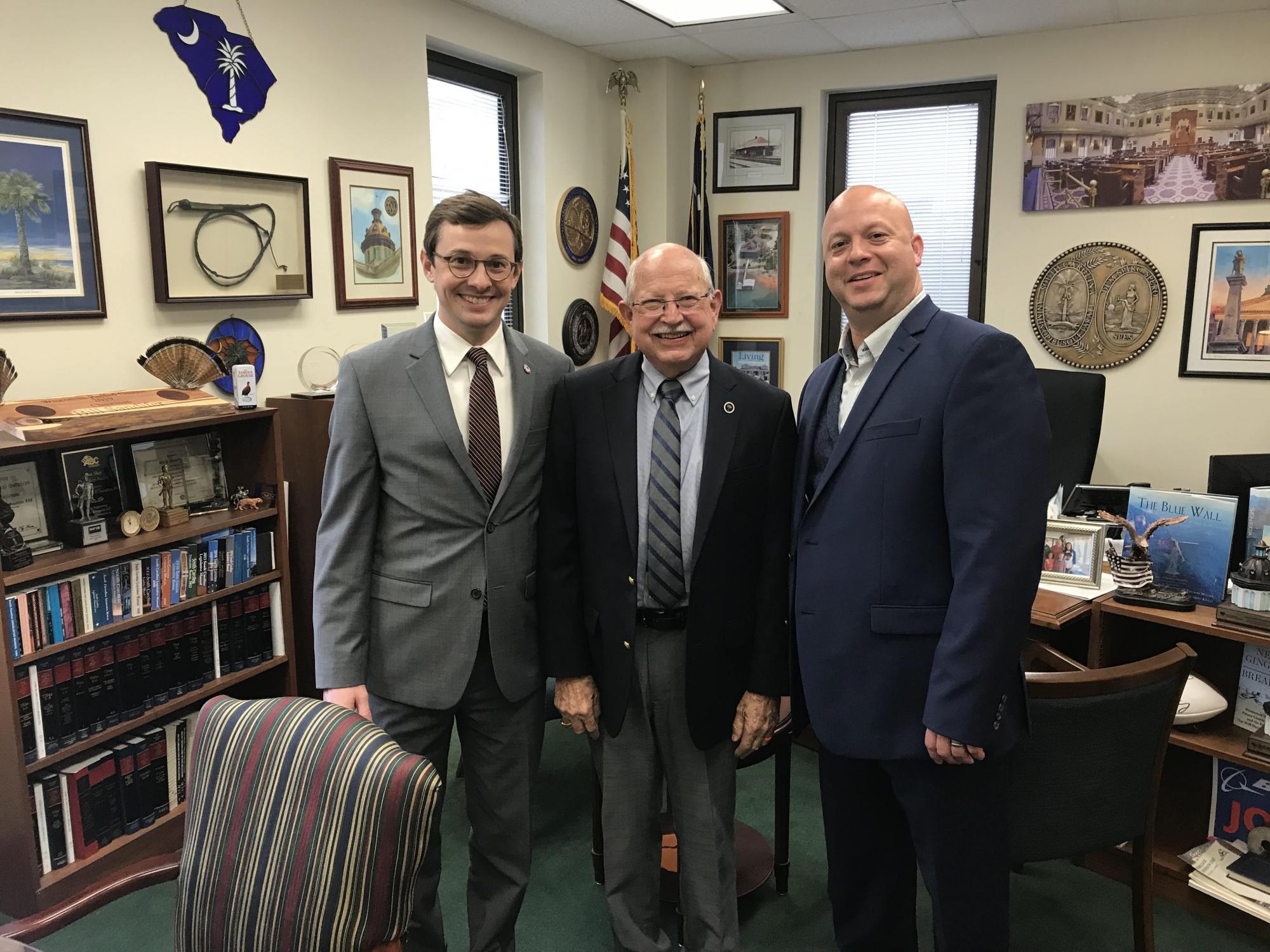 Sens. Thomas Alexander and Mia McLeod and Reps. Bruce Bannister and Marvin Pendarvis discuss legislation at the SCAC Mid-year Conference.
Sens. Thomas Alexander and Mia McLeod and Reps. Bruce Bannister and Marvin Pendarvis discuss legislation at the SCAC Mid-year Conference. SCAC President and Clarendon County Council Chairman Dwight Stewart and Clarendon County Administrator David Epperson meet with Representative Robert Ridgeway to discuss legislation.
SCAC President and Clarendon County Council Chairman Dwight Stewart and Clarendon County Administrator David Epperson meet with Representative Robert Ridgeway to discuss legislation. Oconee councilmen Paul Cain and Julian Davis III meet with Representative William “Bill” Sandifer to discuss legislation.
Oconee councilmen Paul Cain and Julian Davis III meet with Representative William “Bill” Sandifer to discuss legislation. Judge Amy McCullough and SCAC staff member Daina Riley made presentations at the 2020 Association of Probate Judges Legislative Conference.
Judge Amy McCullough and SCAC staff member Daina Riley made presentations at the 2020 Association of Probate Judges Legislative Conference.SCAC held its Mid-year Conference this week. In addition to attending Institute of Government classes and presentations to include a legislative panel, many county officials were able to have productive meetings with members of the General Assembly. The majority of the discussion in the General Assembly centered around a few issues - education reform, Santee Cooper, and the budget. The House Ways and Means committee finished up its work on the budget and will take up the report from the Department of Administration (DOA) regarding Santee Cooper next week. Items of interest in the budget will be discussed in the Friday Report.
The Senate continued into its sixth week of debate on the education reform bill (S. 419) with no clear resolution in sight. The Senate Finance Committee continued to take testimony from parties identified in the DOA report, to include the DOA, Santee Cooper, Dominion, and NextEra. SCAC will continue to monitor this issue as to concerns regarding fee-in-lieu of tax (FILOT) agreements, electricity and water supplies, and utility rates. The Senate Judiciary Committee is also conducting hearings in regards to Santee Cooper and the findings in the DOA report. Both committees will continue to conduct hearings next week.
Revenue, Finance, and Economic Development
State Budget and Capital Reserve Fund – H. 5201 and H. 5202.
The House Ways and Means Committee approved the budget bill (H. 5201) and Capital Reserve Fund bill (H. 5202). Both bills will be debated on the House floor the week of March 9th. The Local Government Fund was funded with an additional $11,687,035 over last year’s amount.
The budget bill also earmarks an additional $250,000 for County Veterans’ Affairs Offices, an SCAC policy position. Please thank the members of the House Ways and Means Committee for funding the Local Government Fund and our Veterans’ Affairs Offices request. The budget also contains a 2 percent raise for state employees. Finally, the budget bill includes a $1500 salary supplement for each county coroner, probate judge, clerk of court, and sheriff.
Here are some new provisos of interest in the budget bill:
Proviso 50.21 – Funding for Rural Infrastructure. This proviso would amend qualifications for funding under the Department of Commerce’s Rural School District and Economic Development Closing Fund to include projects located in “Tier IV” counties.
Proviso 108.rce – Return to Covered Employment. This proviso would allow a retired member of the South Carolina Retirement System or the Police Officers Retirement System to be hired and return to employment covered by any system provided for in law, without regard to earnings, without affecting the monthly retirement allowance the member is receiving from the system if the member has not been engaged to perform services for a participating employer in any system provided for in law for compensation in any capacity, whether as an employee, independent contractor, leased employee, joint employee, or other classification of worker, for a period of 12 consecutive months subsequent to retirement.
Proviso 113.cps – County Property Sales Tax Collections. In the current fiscal year, this proviso would allow counties with capital project sales tax collections in excess of the amount necessary to complete all projects for which the tax was imposed, and the tax has not yet expired, to pledge and use the excess collections to fund road improvements, intersection improvements, and pedestrian transportation. To utilize this proviso, before the tax expires, the county must adopt an ordinance specifying the purposes for which the funds will be used. A county may expend distributions received pursuant to this section to meet the requirements of this proviso.
Proviso 117.rer – Renewable Energy Resource Tax Exemption. This proviso would provide that for the property tax year 2020, a “renewable energy resource” property having a nameplate capacity of and operating at no greater than 20 kilowatts, as measured in alternating current, shall be exempt from ad valorem taxation subject to provisions of Section 12-4-720 of the S.C. Code of Laws. For purposes of this provision, “renewable energy resource” has the same meaning as provided in Section 58-40-10 and includes, but is not limited to, all components that enhance the operational characteristics of the generating equipment, such as an advanced inverter or battery storage device, and equipment required to meet all applicable safety, performance, interconnection, and reliability standards established by the commission, the National Electrical Code, the National Electrical Safety Code, the Institute of Electrical and Electronics Engineers, Underwriters Laboratories, the Federal Energy Regulatory Commission, and any local governing authorities.
Proviso 118.rrf – Disaster Relief and Resilience Reserve Fund. This proviso would create the Disaster Relief and Resilience Reserve Fund that would be housed under the State Treasurer’s Office. Funds appropriated to the fund may only be used for disaster relief assistance, hazard mitigation and infrastructure improvements, and statewide resilience planning. Interest accrued by the fund must remain in the fund and unexpended funds shall be retained and carried forward to be used for the same purposes.
Business License Tax – H. 4431. The House Labor, Commerce and Industry Committee discussed the ad hoc subcommittee’s amendment to H. 4431 this week. House LCI largely adopted the ad hoc subcommittee’s amendment but made a few changes.
Class schedules would now be recommended by the Municipal Association of South Carolina (MASC) and then “adopted” by the Director of the Revenue and Fiscal Affairs Office in the new language. The bill also allows the Revenue and Fiscal Affairs Office to contract with software providers and payment processors to implement a payment portal. Overall, the bill provides for standardization, including license forms, renewal dates, and the appeals procedure. The bill also bases a business license tax on a business’s gross income and further defines “gross income.” The original bill language would have based a business license tax on a business’s net income. This change should ensure that the bill will be revenue neutral. H. 4431 was given a favorable report, as amended, and is awaiting second reading on the House calendar.
Professional Licenses – S. 455. Both S. 455 and H. 3263 were considered in 2019, and both would allow military members and their spouses who hold a professional license in another state to have reciprocity to practice their profession while stationed in this state. This is an SCAC policy position. H. 3263 failed to receive second and third readings by Sine Die last year, but language from the House bill was attached to the Senate bill. The Conference Committee on S. 455, encompassing both bills at some point throughout the process, met this week and agreed on language that essentially adopts the House version. The House and Senate conferees must now present the conference report for S. 455 to their respective bodies for adoption.
Public Safety, Corrections and Judicial
Inmate Restraints – H. 3967. This bill provides that pregnant inmates may not be restrained except when being transported. The bill also provides that during certain situations that are related to pregnancy such as labor, delivery, and postpartum recovery, the inmate may only be restrained if they pose a risk to themselves or others, or if they are a flight risk. The bill provides for the method of restraint when restraint is allowed. A Senate Corrections and Penology subcommittee considered an amendment that would broaden the scope of the bill, but the subcommittee gave the bill a favorable report with no amendment to provide stakeholders with time to review and work on the amendment language. An amendment should be discussed at the next full committee meeting.
County Government and Intergovernmental
Absentee Ballots — S. 867. S. 867 would allow poll workers to open and scan absentee ballots beginning at 9:00 a.m. on the day preceding an election, an SCAC policy position. Currently, they can only begin this process at 9:00 a.m. on Election Day. The absentee ballots would not be tabulated until the polls close on Election Day. The Senate adopted an amendment to address the problem of not having a procedure to process a challenge to an in-person absentee ballot as a result of the new paper-based voting system and gave the bill second reading. The Senate adopted an amendment that made some technical changes and gave the bill third reading.
Newly-Introduced Legislation
View/Download Full Text for Newly-Introduced Legislation
Note: If you would like to offer comments to the SCAC staff, please call us toll-free at 1-800-922-6081, fax to (803) 252-0379, or send an email. You can also go to www.scstatehouse.gov and click on "Legislation," then "Introduced Legislation."
Senate Bills
S. 1117 — Provides that trucks over 26,000 pounds would be registered and pay road use fees through the South Carolina Department of Motor Vehicles. It also exempts interstate trucks from local road use fees.
House Bills
H. 5260 — Creates the Optional Shared-Risk Defined Benefit plan separate and distinct from the South Carolina Retirement System.
H. 5261 — Provides that the Department of Motor Vehicles may issue various military special license plates.